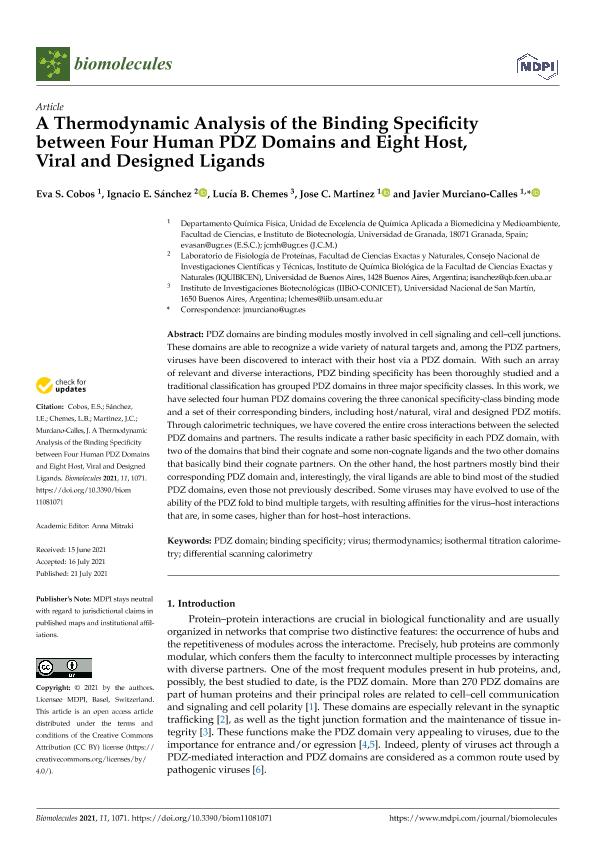Mostrar el registro sencillo del ítem
dc.contributor.author
Cobos, Eva S.
dc.contributor.author
Sánchez Miguel, Ignacio Enrique

dc.contributor.author
Chemes, Lucia Beatriz

dc.contributor.author
Martinez, Jose C.
dc.contributor.author
Murciano Calles, Javier
dc.date.available
2022-07-29T17:46:09Z
dc.date.issued
2021-08
dc.identifier.citation
Cobos, Eva S.; Sánchez Miguel, Ignacio Enrique; Chemes, Lucia Beatriz; Martinez, Jose C.; Murciano Calles, Javier; A thermodynamic analysis of the binding specificity between four human pdz domains and eight host, viral and designed ligands; MDPI AG; Biomolecules; 11; 8; 8-2021; 1-14
dc.identifier.issn
2218-273X
dc.identifier.uri
http://hdl.handle.net/11336/163566
dc.description.abstract
PDZ domains are binding modules mostly involved in cell signaling and cell–cell junctions. These domains are able to recognize a wide variety of natural targets and, among the PDZ partners, viruses have been discovered to interact with their host via a PDZ domain. With such an array of relevant and diverse interactions, PDZ binding specificity has been thoroughly studied and a traditional classification has grouped PDZ domains in three major specificity classes. In this work, we have selected four human PDZ domains covering the three canonical specificity-class binding mode and a set of their corresponding binders, including host/natural, viral and designed PDZ motifs. Through calorimetric techniques, we have covered the entire cross interactions between the selected PDZ domains and partners. The results indicate a rather basic specificity in each PDZ domain, with two of the domains that bind their cognate and some non-cognate ligands and the two other domains that basically bind their cognate partners. On the other hand, the host partners mostly bind their corresponding PDZ domain and, interestingly, the viral ligands are able to bind most of the studied PDZ domains, even those not previously described. Some viruses may have evolved to use of the ability of the PDZ fold to bind multiple targets, with resulting affinities for the virus–host interactions that are, in some cases, higher than for host–host interactions.
dc.format
application/pdf
dc.language.iso
eng
dc.publisher
MDPI AG
dc.rights
info:eu-repo/semantics/openAccess
dc.rights.uri
https://creativecommons.org/licenses/by/2.5/ar/
dc.subject
BINDING SPECIFICITY
dc.subject
DIFFERENTIAL SCANNING CALORIMETRY
dc.subject
ISOTHERMAL TITRATION CALORIMETRY
dc.subject
PDZ DOMAIN
dc.subject
THERMODYNAMICS
dc.subject
VIRUS
dc.subject.classification
Bioquímica y Biología Molecular

dc.subject.classification
Ciencias Biológicas

dc.subject.classification
CIENCIAS NATURALES Y EXACTAS

dc.title
A thermodynamic analysis of the binding specificity between four human pdz domains and eight host, viral and designed ligands
dc.type
info:eu-repo/semantics/article
dc.type
info:ar-repo/semantics/artículo
dc.type
info:eu-repo/semantics/publishedVersion
dc.date.updated
2022-06-08T13:33:38Z
dc.journal.volume
11
dc.journal.number
8
dc.journal.pagination
1-14
dc.journal.pais
Estados Unidos

dc.description.fil
Fil: Cobos, Eva S.. Universidad de Granada; España
dc.description.fil
Fil: Sánchez Miguel, Ignacio Enrique. Consejo Nacional de Investigaciones Científicas y Técnicas. Oficina de Coordinación Administrativa Ciudad Universitaria. Instituto de Química Biológica de la Facultad de Ciencias Exactas y Naturales. Universidad de Buenos Aires. Facultad de Ciencias Exactas y Naturales. Instituto de Química Biológica de la Facultad de Ciencias Exactas y Naturales; Argentina
dc.description.fil
Fil: Chemes, Lucia Beatriz. Consejo Nacional de Investigaciones Científicas y Técnicas. Centro Científico Tecnológico Conicet - La Plata. Instituto de Investigaciones Biotecnológicas. Universidad Nacional de San Martín. Instituto de Investigaciones Biotecnológicas; Argentina
dc.description.fil
Fil: Martinez, Jose C.. Universidad de Granada; España
dc.description.fil
Fil: Murciano Calles, Javier. Universidad de Granada; España
dc.journal.title
Biomolecules
dc.relation.alternativeid
info:eu-repo/semantics/altIdentifier/doi/http://dx.doi.org/10.3390/biom11081071
Archivos asociados
